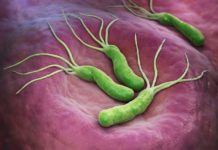Experiments on the human intestinal microflora transfer to the digestive tract of mice enabled scientists from the University of Washington to identify the bacteria causing weight loss. Their presence does not let the body store excess fat.
Experts grew mice under sterile conditions, so that bacteria could not reach their intestines. Then one group of rodents was “infected” with obese human’s microflora, and another – with the microflora of his twin brother with normal weight (the twins became donors of microflora because their genetic material is the same).
It was found that the mice that received obese human’s bacteria, started metabolic changes that lead to obesity. Mice that received the microflora of the person with normal weight, did not get obese.
At the second stage of the experiment, two groups of mice were placed in one cage. The rodents could “share” microflora eating each other’s feces. On the 10th day of living together, obese mice started losing weight. However, “thin” mice did not get obese.
Having analyzed the changes in the microflora composition in two groups of mice after their staying in the same cage, the researchers found out: the obese mice got the Bacteroidetes bacteria available in the intestines of normal rodents. Apparently, they allowed the mice to recover from obesity quickly.
Meanwhile, weight gain is also influenced by the daily regimen: night owls get fat faster than early risers do.






